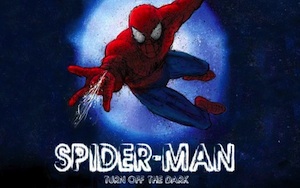
SPIDER-MAN 2.NO
By now, you’ve probably read at least a portion if not all of the hoopla that surrounds Spider-man: Turn Off the Dark, originally helmed by book writer and director Julie Taymor. Its reputation for being rife with technical and structural problems and being one of the most ambitious productions ever to take place on the Great White Way precedes it. Round those off with an exorbitant production cost, and you’ve got the makings of a press darling that’s not likely to lose the public’s interest anytime soon. Unless, of course, you see the revamped version by creative consultant Philip William McKinley and book writers Glen Berger and Roberto Aguirre-Sacasa.
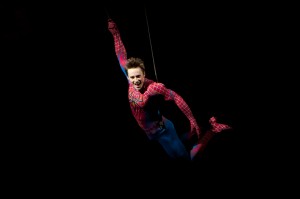 Papa may have a brand new bag, but it’s full of weak tricks and not enough treats. The basics of the popular Marvel Comics tale is there: geeky nerd boy Peter Parker (Reeve Carney) gets nibbled on by a radioactive spider while on a field trip. The 8-legged predator morphs Parker into a fearless aerialist that indulges his scientific interests by day and scales skyscrapers to fight crime by night. To complicate his dual identity, he falls in love with Mary Jane Watson (Jennifer Damiano), a wannabe Broadway starlet that Damiano portrays as being far more independent than the helpless ninny that has sometimes been sketched in the animated versions of the comic. Also more “with it” and lively than usual are Uncle Ben (Ken Marks) and Aunt May (Isabel Keating), the elderly couple that raise Parker and whose frailty (that needs protecting) is normally a significant factor to the audience’s heartstrings. It isn’t here. What makes Spiderman a mixed and often unsatisfying bag is the execution of this superhero tale. Stylistically, it bounces around almost as much as all the ensemble actors that portray Spidey do, and is conceptually imbalanced, drawing you in at one moment and leaving you cold the next.
Papa may have a brand new bag, but it’s full of weak tricks and not enough treats. The basics of the popular Marvel Comics tale is there: geeky nerd boy Peter Parker (Reeve Carney) gets nibbled on by a radioactive spider while on a field trip. The 8-legged predator morphs Parker into a fearless aerialist that indulges his scientific interests by day and scales skyscrapers to fight crime by night. To complicate his dual identity, he falls in love with Mary Jane Watson (Jennifer Damiano), a wannabe Broadway starlet that Damiano portrays as being far more independent than the helpless ninny that has sometimes been sketched in the animated versions of the comic. Also more “with it” and lively than usual are Uncle Ben (Ken Marks) and Aunt May (Isabel Keating), the elderly couple that raise Parker and whose frailty (that needs protecting) is normally a significant factor to the audience’s heartstrings. It isn’t here. What makes Spiderman a mixed and often unsatisfying bag is the execution of this superhero tale. Stylistically, it bounces around almost as much as all the ensemble actors that portray Spidey do, and is conceptually imbalanced, drawing you in at one moment and leaving you cold the next.
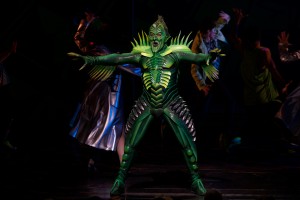 There are quite a few eye-popping moments. Scenic designer George Tsypin’s elaborate sets are imbued with optical illusions and graphics that pay homage to the show’s comic origins. Eiko Ishioka’s Sinister Six (the Green Goblin’s henchmen) costumes explode with mutant DNA that take on an assortment of creepy shapes, even if some of the results are cheesy. And the masks, originally designed by the ousted Taymor, add a certain loopy charm. Unfortunately, Spider-man is an uneasy meld of comedy, science fiction, romance, drama, and myth.
There are quite a few eye-popping moments. Scenic designer George Tsypin’s elaborate sets are imbued with optical illusions and graphics that pay homage to the show’s comic origins. Eiko Ishioka’s Sinister Six (the Green Goblin’s henchmen) costumes explode with mutant DNA that take on an assortment of creepy shapes, even if some of the results are cheesy. And the masks, originally designed by the ousted Taymor, add a certain loopy charm. Unfortunately, Spider-man is an uneasy meld of comedy, science fiction, romance, drama, and myth.
The insertion of Arachne (T.V. Carpio), the Greco-Roman, mythological weaver that was turned into a spider by Athena out of jealousy, is a creative addition to the plot that is thematically relevant, but it not only doesn’t exist in the original concept of the series, its presence is also overbearing. The introduction of this character is handled artistically with a bevy of maidens that pendulate over the audience, but the dreamy sequence is ill-fitting for this story. It throws a lyrical veneer on the show that doesn’t belong there.
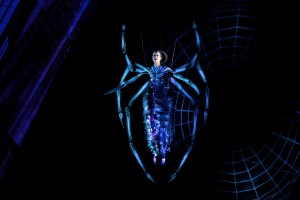 As the show proceeds, it spirals further and further into an identity crisis. It never takes a firm stance on what genre it wants to be. Patrick Page adds comedy by going from glam to ham when the whimsical Norman Osborn turns into Green Goblin, but at least he’s amusing. The same cannot be said for the rest of the show. Science fiction takes over in an impressive video projection segment that illustrates the Sinister Six ransacking New York City, but we’re soon zapped back to a sappy romance between Parker and Mary Jane. It’s not that these leaps can’t work theoretically, but here, they’re handled choppily.
As the show proceeds, it spirals further and further into an identity crisis. It never takes a firm stance on what genre it wants to be. Patrick Page adds comedy by going from glam to ham when the whimsical Norman Osborn turns into Green Goblin, but at least he’s amusing. The same cannot be said for the rest of the show. Science fiction takes over in an impressive video projection segment that illustrates the Sinister Six ransacking New York City, but we’re soon zapped back to a sappy romance between Parker and Mary Jane. It’s not that these leaps can’t work theoretically, but here, they’re handled choppily.
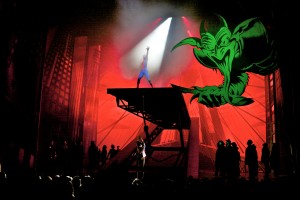 Another aspect that could have used much more finesse is arguably the most important of them all: Spider-man in acrobatic mode. The first moment that Spider-man displays his agility should be the most exciting of them all, but instead of being wrapped up in awe, Spider-man is wrapped up in wires. No special care is taken to unveil the magical powers that the spider bestows upon him. Action sequences that follow this reveal employ a special technique that hides the “strings” in the dark, but the entry point to his metamorphoses should make Spider-man turn off the light earlier when it really matters.
Another aspect that could have used much more finesse is arguably the most important of them all: Spider-man in acrobatic mode. The first moment that Spider-man displays his agility should be the most exciting of them all, but instead of being wrapped up in awe, Spider-man is wrapped up in wires. No special care is taken to unveil the magical powers that the spider bestows upon him. Action sequences that follow this reveal employ a special technique that hides the “strings” in the dark, but the entry point to his metamorphoses should make Spider-man turn off the light earlier when it really matters.
Bono and the Edge’s score should be an integral part of the show, but the songs are so insipid that their contribution is more damaging than conducive. Rather than author a gritty, edgy component, the rock gods have only authored confusion. Add Jason Snow’s often unexplainable choreography and you have a jumble of limbs as well as a jumble of music notes.
Despite the update, Spider-man: Turn Off the Dark still needs a lot more work. It may be version 2.0, but there is still an abundance of glitches.
cindypierre @ stageandcinema.com
photos by Jacob Cohl
Spider-man: Turn Off the Dark
open run
for tickets, visit http://spidermanonbroadway.marvel.com/
